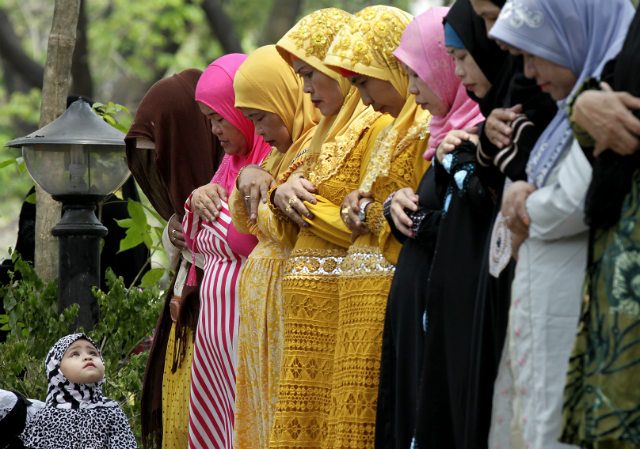SUMMARY
This is AI generated summarization, which may have errors. For context, always refer to the full article.

MANILA, Philippines – Presidents of the Philippines’ Jesuit universities on Monday, October 5, announced their support for a proposed law to create a more powerful Muslim region to end a 4-decade secessionist movement in the southern Philippines.
In a half-page advertisement on the Philippine Daily Inquirer, presidents of the different Ateneo universities said the proposed Bangsamoro Basic Law (BBL) is not an ordinary piece of legislation. Rather, it is “crafted to do social justice.”
“Here, our legislators are not only hewers of laws. They are builders of peace. They are architects of our future, their responsibility,” the school presidents said.
“Their fragile moment for building peace they ought not to squander through absence from crucial legislative sessions, indifference, or fear,” they added.
The following school heads from the Society of Jesus, better known as the Catholic Church’s Jesuit religious order, signed the statement:
- Father Joel Tabora, president of the Ateneo de Davao University
- Father Jose Ramon Villarin, president of the Ateneo de Manila University
- Father Primitivo Viray, president of the Ateneo de Naga University
- Father Karel San Juan, president of the Ateneo de Zamboanga University
- Father Roberto Yap, president of Xavier University – Ateneo de Cagayan
President Benigno Aquino III himself studied in one of these Jesuit schools, the Ateneo de Manila University.
This statement comes days before the Senate and House of Representatives adjourn their regular session on Saturday, October 10.
Senate President Franklin Drilon earlier said both houses of Congress will prioritize passing the BBL, a law pushed by Aquino, before the session is adjourned.
The BBL aims to create a Muslim region more potent than the current Autonomous Region in Muslim Mindanao (ARMM).
However, a controversial police operation that killed at least 67 people, including 44 members of an elite police force, stalled the BBL.
This was after critics blamed these deaths on the rebel group Moro Islamic Liberation Front (MILF), which is engaged in a peace process with the Philippine government. (READ: Mamasapano, the President, and the Bangsamoro Basic Law)
‘Peace or war’ at stake
In their statement, the Ateneo presidents pointed out that the executive branch of the government “has done its part” by signing a framework agreement leading to the BBL. The government forged this deal, called the Comprehensive Agreement on the Bangsamoro (CAB), with the MILF.
The Ateneo presidents warned that “should the legislators or the courts repudiate the peace agreement that the executive forged with the MILF, they take responsibility for the ensuring peace or war into their own hands.”
The school heads then urged both houses of Congress to pass a BBL that guarantees the following:
- “Recognition of the Bangsamoro identity and its peoples’ aspirations based on their right to self-determination;
- “Integration of the spirit of the CAB in the proposed legislation in fidelity to the 1987 Philippine Constitution and its mandate for an autonomous region for Muslim Mindanao;
- “Provisions that surpass, not diminish, the provisions of the Expanded Organic Act for the ARMM, further enhancing what Filipino Muslims already enjoy under this law;
- “Genuine autonomy through which the Bangsamoro Government is empowered to lead its peoples to a future they desire based on the genius of their rich culture;
- “Acceptance of the concept of asymmetrical political entity where the Bangsamoro Government enjoys powers greater than local government units (LGUs) but fully subject to national governance;
- “Measures to strengthen the Shariah courts and their applicability to the Bangsamoro followers of Islam;
- “Bangsamoro entitlement to create its own sources of revenue and to levy taxes, fees, and charges guided by the principles of devolution of powers;
- “A just and equitable share in the revenues generated through the exploration, development, and utilization of the natural resources, consistent with the principles of environmental stewardship, within the jurisdiction of the Bangsamoro;
- “Full respect and protection for civil, political, economic, social, and cultural human rights of all the inhabitants including the indigenous peoples, women, children, and youth in the Bangsamoro territory and support for the passage of laws that promote, uphold, and protect the same; and
- “Transitional justice and normalization clauses, reflective of the spirit and intent of the CAB”
The Ateneo presidents said: “The establishment of a Muslim region in MIndanao that is truly autonomous is mandated by the Constitution as a social justice imperative. Let this social justice no longer be postponed.”
Earlier, Cotabato Archbishop Orlando Cardinal Quevedo, 7 Catholic bishops, and 50 Christian and Muslim advocates also joined forces for a BBL that “secures justice and peace.” – Rappler.com
Add a comment
How does this make you feel?
There are no comments yet. Add your comment to start the conversation.